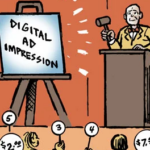Google’s recent promise to bring more transparency to its Performance Max product—including better channel reporting and visibility into creative assets—is long overdue.
It’s also not a coincidence.
Years of litigation and a landmark antitrust ruling finally forced Google to acknowledge what the rest of the industry has long understood: You don’t have to control both sides of a transaction to succeed. But it sure makes it easier.
And for Google, control has always been the strategy.
For years, advertisers and publishers have asked for better visibility into how their dollars are spent. They’ve asked for neutrality, accountability and transparency. But they had none of those things until the courts got involved.
Retroactive reinforcement won’t be enough to ensure a fairer and more innovative ad market going forward. The advertising industry needs proactive antitrust enforcement.
Reactive enforcement isn’t enough
By the time the courts get around to declaring a monopoly, the damage is already done. Independent competitors have been forced out. Innovation has been sidelined. The market has warped itself to satisfy the dominant player’s incentives.
The question we should ask now isn’t whether antitrust enforcement is necessary; it’s how to bring it in sooner and more effectively.
Big Tech’s advantage is time
The Big Tech companies scale faster, cross-subsidize more easily and can afford to lose money for decades to win market share. They can dominate sectors they might otherwise have trouble even entering.
Take Amazon. Its dominance in retail gives it an unnatural advantage in streaming. It can overbid for NBA rights and absorb the loss. It doesn’t have to win every ad deal—just enough of them to outlast the competition. And when the dust settles, it can dictate terms to a less competitive market.
That’s not a concern for broadcasters only. It’s a warning for all of us.
Because once you let dominance compound—across markets, channels and tech stacks—you don’t just lose market diversity. You lose optionality, creativity and long-term value for advertisers.
Amazon is already facing an antitrust lawsuit brought against it by the Federal Trade Commission and 17 state attorneys general over its dominance in ecommerce and the prevalence of ads in its search results. But the FTC filed its lawsuit back in 2023, and the most recent development came in April when Amazon lost its effort to have the case dismissed on procedural grounds.
This demonstrates how these antitrust actions unfold over years and how Big Tech can deploy delay tactics while continuing to consolidate power. Consider how Amazon has been able to seize about 40% of the emerging retail media market (although my gut feeling is that Amazon’s share of digital retail media is significantly higher), while its antitrust case grinds its way through the legal process.
We should know better
Protecting markets from monopolies is nothing new, and we used to be better at it.
The US didn’t allow one company to own the railroads. We didn’t let broadcasters with 40% market share buy their way to dominance.
But we’ve let digital giants control essential infrastructure – from browsers to auctions to identity – with much less scrutiny.
If we want to protect healthy competition during the next decade, we need rules that anticipate how power will be abused, not just wait to document it after the fact.
We need structural limits. We need early intervention. And we need to stop mistaking “product integration” for innovation when it’s just a market control strategy.
Waiting 10 years to do what we should’ve done today would be a gift to the monopolists. It’s already left advertisers and publishers with subpar, opaque products that both fail to drive optimal results and provide a terrible consumer experience, but that they must keep using because of one company’s market dominance.
Reducing competition harms everyone but the monopolist. Regulators need to look ahead now to prevent it from happening again with a company that took its name from a relentless river. Or we may all get flooded.
“Data-Driven Thinking” is written by members of the media community and contains fresh ideas on the digital revolution in media.
Follow Viant and AdExchanger on LinkedIn.
For more articles featuring Tim Vanderhook, click here.














